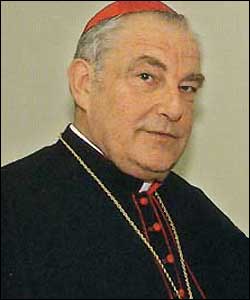Psychological Testing of Suspect Seminarians
Guidelines for the Use of Psychology in the Admission and Formation of Candidates for the Priesthood by the Congregation for Catholic Education was released at the Vatican by October 30, 2008. The document was approved by Pope Benedict XVI in June.
The document says that in determining whether a candidate for the priesthood has the ability to live a celibate life, the candidate’s sexual orientation should be evaluated in order to determine that uncertain sexual identity or “deep-seated homosexual tendencies” are not present. 
This instruction appears to be the next step to weed out gay or bisexual seminarians. The first salvo was the 2005 document, Vatican Instruction: Priesthood Candidates and Homosexuality.
“The church, while profoundly respecting the persons in question, cannot admit to the seminary or to holy orders those that practice homosexuality, present deep-seated homosexual tendencies or support the so-called ‘gay culture,'” the November 29, 2005 document stated.
“Such persons,” it said, “find themselves in a situation that gravely hinders them from relating correctly to men and women.” It also went on to say, “It would be gravely dishonest for a candidate to hide his own homosexuality in order to proceed, despite everything, toward ordination.”
At the press conference marking the release of the new document, Cardinal Zenon Grocholewski, prefect of the Congregation for Education, was asked about the 2005 document, specifically whether a homosexually oriented man who was nevertheless committed to celibacy could be ordained a priest. 
He answered: “The candidate does not necessarily have to practice homosexuality. He can even be without sin. But if he has this deeply seated tendency, he cannot be admitted to priestly ministry precisely because of the nature of the priesthood, in which a spiritual paternity is carried out.”
Cardinal Grocholewski was also asked why, if a man with strong heterosexual tendencies but who is celibate can be ordained, the same could not be true of a man with homosexual tendencies.
His answer: “Because it’s not simply a question of observing celibacy as such. In this case, it would be a heterosexual tendency, a normal tendency. In a certain sense, when we ask why Christ reserved the priesthood to men, we speak of this spiritual paternity, and maintain that homosexuality is a type of deviation, a type of irregularity…
“Therefore, it is a type of wound in the exercise of the priesthood, in forming relations with others. And precisely for this reason we say that something isn’t right in the pysche of such a man. We don’t simply talk about the ability to abstain from these kinds of relations.”
The interviews with Cardinal Grocholewski are actually worse than the document itself. If his remarks reflected the logic of the document, they degrate and demean the good men who feel called to minister to the community as priests, but would be banned from doing so because their homosexual orientation disqualifies them from “spiritual paternity.”
What is alarming about this document is the intent to separate gay men from priestly ministry not because of celibacy issues, but because being homosexual in and of itself is seen as a psychological defect and as a barrier to form relations in a “mature” way with both men and women.
I can only hope this documents drops through a very wide safety net, so no good men are lost to the priesthood because they are gay or bisexual.
If anything, priests and seminarians should have peers and spiritual directors they can talk freely with about their sexual feelings, attractions, and loneliness without fear of repercussion.
This document seems to encourage the opposite. A step back to the pre-sex abuse days of silence.

November 12th, 2008 at 6:54 pm
I can only hope this documents drops through a very wide safety net, so no good men are lost to the priesthood because they are gay or bisexual.
Too late.
November 14th, 2008 at 4:50 pm
Too late indeed. Just over two years ago, I applied for entrance to our diocesan seminary. I went through the entire process successfully after acknowledging from the get-go that I was happily gay, although not then or ever in a relationship and had been sexually abstinent for almost twenty years. I fully embraced a chaste celibate lifestyle. I was told, from an auxiliary bishop on down, “not to worry.” In the end, however, I was asked to withdraw my application “because it could cause problems for the archbishop if Rome found out” [that I was admitted]. I soon after “excommunicated” the Church from myself and have not received the Eucharist since then; if I am not considered suitable to celebrate the sacrament, why should I deign to participate in it? Cardinal Grochelewski is right about the “wound”…although not in the way he describes.
November 15th, 2008 at 7:18 am
Dear Archangel,
I have thought a lot about how to respond to your post. I am afraid that whatever I say will sound cheap against the amount of pain you have be forced to endure…forgive me if it sounds any way other than heartfelt towards you.
The person who gave you the advice to withdraw your candidacy was well-meaning, and maybe even accurate, but what the person did was to rob you of your vocation. They also helped the archbishop to avoid the possibility of taking a stand in your defense. Your vocation was sacrified–and that is a terrible loss for you, and for all of the people who would have eventually welcomed you as a priest and pastor.
In the face of this pain, and the wounds that you carry, I would still ask that you think about coming back sometime in the future. Perhaps you can apply in a different diocese; or follow your call into another ministry. A spiritual wound can be a way for things to flow in, as well as flow out. I also understand, fully, how distance is often necessary for self-respect, grieving, and healing.
Please know I will keep you in my prayers, and hope you will remember me in yours, as well.